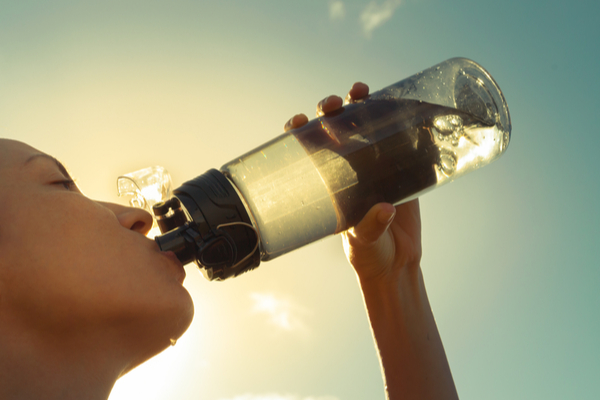You’ve probably heard that you should drink eight glasses of water a day for optimal health and digestion. While that’s a great rule of thumb generally recommended by health authorities, the truth is there isn’t one standard amount of water that everyone should be drinking. How much water you should be drinking daily is probably different from how much your spouse, sister, and coworker needs.
“Water is a transporter of substances and nutrients throughout the body,” says Drew Sinatra, ND, a board-certified naturopathic doctor. “It’s important for temperature regulation (sweating is your body’s way of releasing heat and cooling you down). Drinking water can also flush out toxins, lubricate joints, help relieve constipation, improve concentration, focus, energy, skin elasticity, mood, and overall health.” Since all of your cells use water, and it’s necessary for bodily function, it’s essential to stay properly hydrated. That said, it’s smart to figure out your body’s individual, ideal water intake, because the benefits of drinking water are myriad, affecting everything from metabolism to mood.
There are several factors that help determine how much water you should drink on a daily basis. “Age (elderly people need less water), activity level (challenging workouts and sauna therapy require more water), diet (high protein, sodium, or fiber-rich diets require more water), climate (hot, dry climate, or an elevated terrain require more water), and certain medications are some factors that might affect how much water an individual needs,” Sinatra says.
But how do you know if you’re drinking enough for you? Here are two simple ways to check your own hydration levels:
Urine color and frequency are indicators of hydration level.
Before you begin to count glasses, liters, or ounces, you might want to start by looking at your urine. “A great way to measure if you’re getting enough water is your urine color and frequency,” Sinatra says. “Urinating every 90 minutes to two hours is normal. If your urine is a dark amber color and you’re only urinating every six hours, or longer, it’s likely you aren’t hydrated enough. If your frequency is every 30 minutes and your urine is completely clear, you may be getting too much water and it’s likely going right through your body instead of benefiting you.”
Skin elasticity is a tell-tale sign.
Another way to get an idea of your hydration level, especially for kids and elderly, is to check your skin turgor, which is your skin’s elasticity. “Pinch the skin on the back of your hand for a few seconds and then release,” Sinatra says. “If your skin turgor snaps back quickly into place, you’re probably well hydrated. If it takes time to return to its normal position, you may be dehydrated. Other symptoms of dehydration include dizziness, brain fog, and fatigue.” Said another way: One of the benefits of drinking water is a tighter, more glowing complexion.
All the experts agree that it’s important for hydration to stay away from processed foods as they not only contain little water, they often contain elevated amounts of sodium (even sweet treats), which will hinder your hydrating efforts. The same goes for coffee. “Coffee acts as a diuretic and can dehydrate you,” Sinatra says. “I tell my patients that for every cup of coffee you drink, you should follow it with a cup of water.” Ditto for alcohol, which is also extremely dehydrating (hence tomorrow’s headache, sluggishness, and dull complexion).
How to help yourself get hydrated every day.
If you’re having trouble drinking enough water, there are several ways to boost your water intake beyond plain old water. You can try infusing water with fruit, adding frozen fruit (instead of ice cubes) to your water, or opt for seltzer water with a healthy boost (no-sugar-added varieties are best). You can also focus on consuming foods with a high water content. Many fruits and vegetables are water-dense, making them an excellent source of hydration.
Another great way to eat your way to better hydration is with soup. “Heat up a nice chicken or bone broth and throw in some potassium-rich foods like celery, carrots, or potatoes,” Sinatra says. “Keep the salt low, but a little sodium is actually good for your hydration.” Stews, chilis, smoothies, popsicles, and slushies can also be great options. Just make sure to stick with water-rich ingredients like those mentioned above and avoid too much added salt or sugar.
—
Photo Credit: KieferPix / Shutterstock.com
